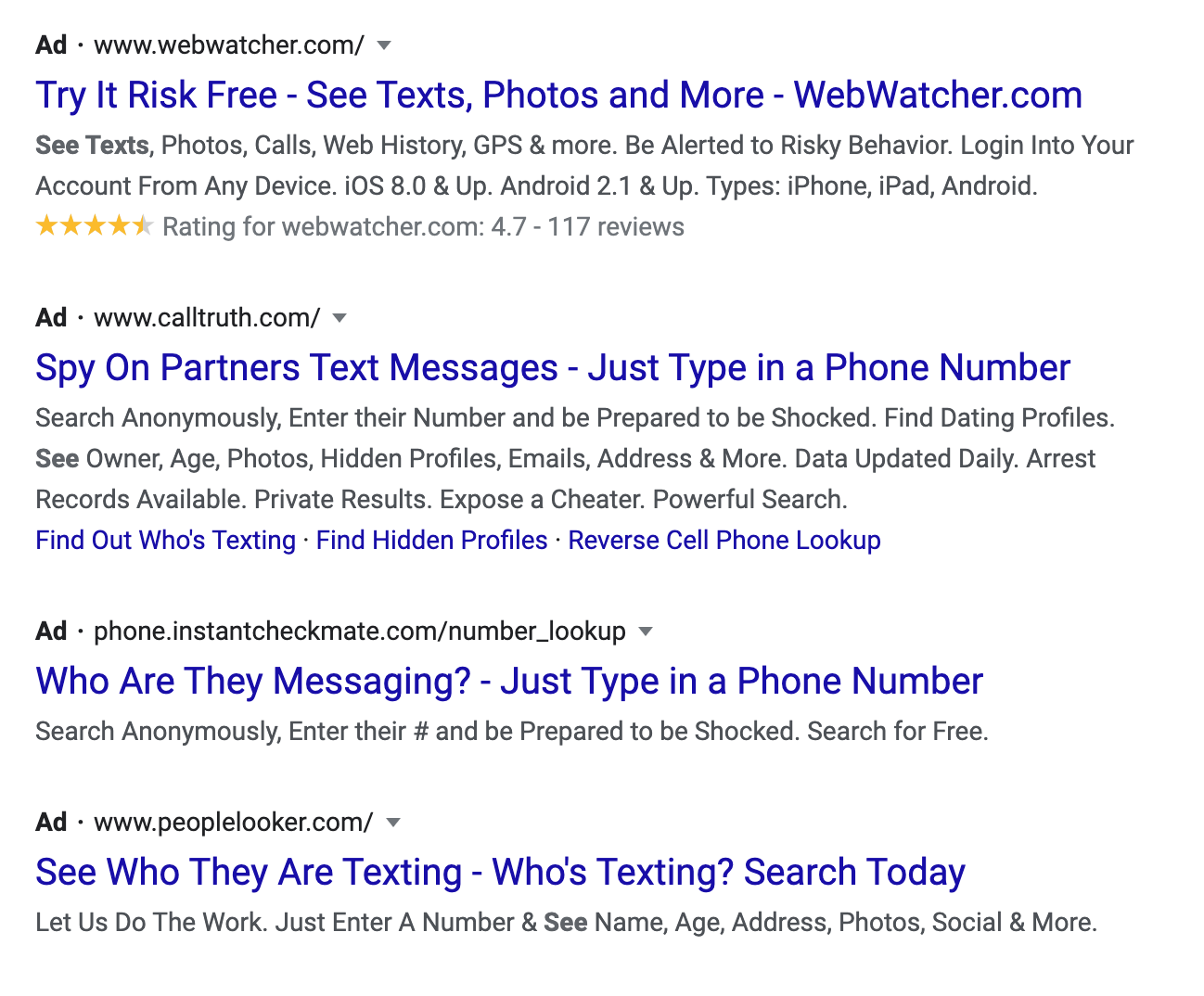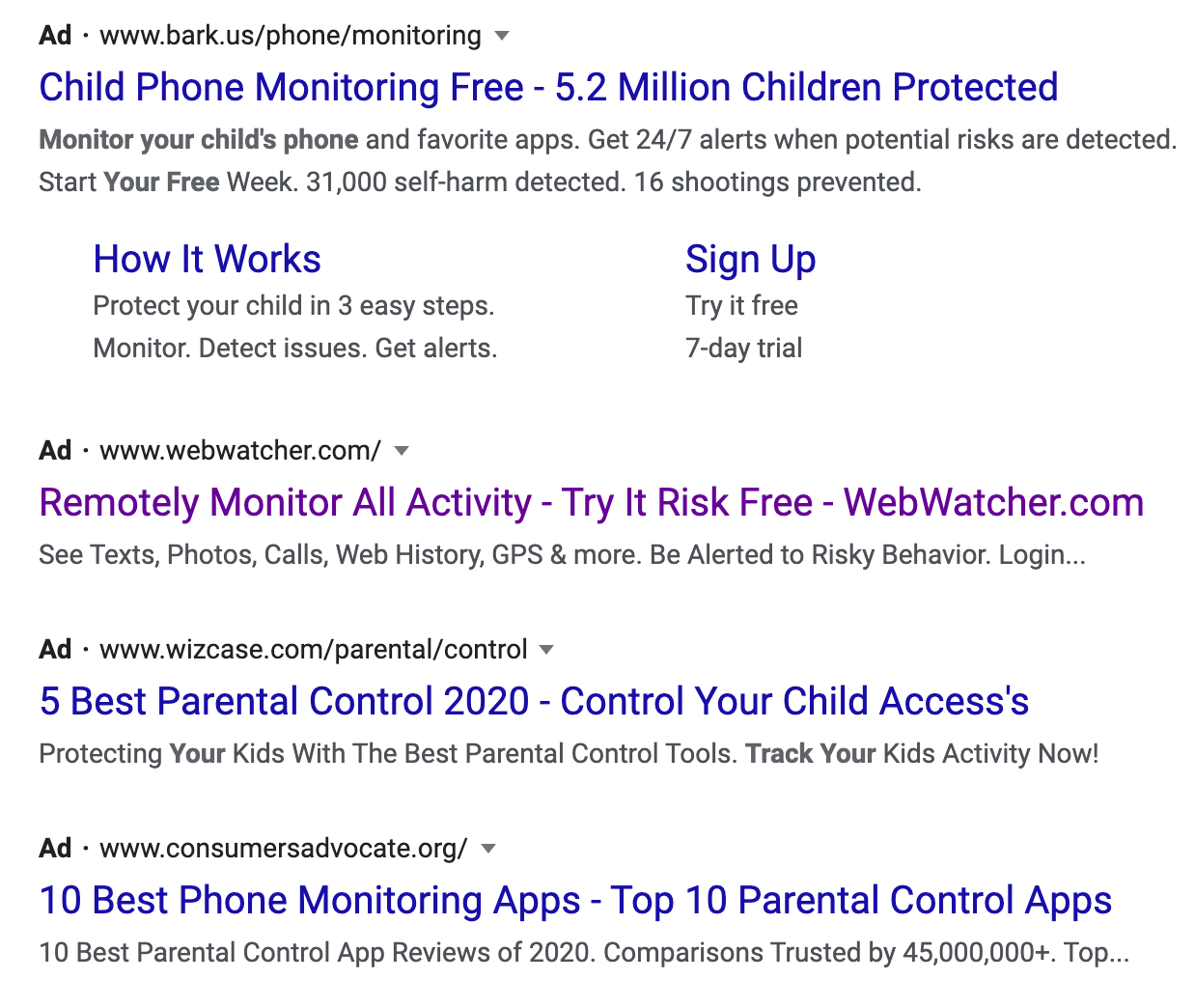When most of us think of companies paving an uncompromisingly ethical path into the future, market power, rather than our personal well-being.
Case in point: according to a recent update to the company’s ad policies, Google’s going to start enforcing more stringent terms against tech players looking to advertise what they call “spyware and surveillance technology.” Specifically, as they put it, the update is meant to crack down on “products or services that are marketed or targeted with the express purpose of tracking or monitoring another person or their activities without their authorization.”
Folks that continue advertising these products, according to the company, will be given a hefty warning to shape up their ad in a week, or risk a suspension on their account.
Despite the fact that Google preaches how much it values this type of consumer consent, tech critics, federal regulators and this very journalist have all called the company out on deliberately burying the specifics of what a consumer’s signing up for when they, say, use a Chrome browser or buy an Android device. In the past, for reference, I’ve found it quite literally impossible to opt-out of Google’s tracking — consensual or otherwise — once you get your hands on one of their phones.
Sadly though, it’s worth assuming that ads for Android aren’t going anywhere. That said, Google did offer what it called a “non-exhaustive” list of some of the products that can’t be advertised on its platform anymore, including:
-
Spyware and technology used for intimate partner surveillance including but not limited to spyware/malware that can be used to monitor texts, phone calls, or browsing history
-
GPS trackers specifically marketed to spy on or track someone without their consent
-
Promotion of surveillance equipment (cameras, audio recorders, dash cams, nanny cams) marketed with the express purpose of spying
Woof. OK, let’s start with that first point. For some unexplained reason, we’ve recently seen an absolute boom in products aimed at catching those pesky “cheating girlfriends/boyfriends.” Generally, these products are little more than a sophisticated piece of malware that can be installed on a target’s computer or phone, ostensibly giving the hacker in question nearly unlimited access to every call made, website browsed, or text sent by their allegedly unfaithful partner.
Yes, it sounds creepy and legally dubious — that’s because it is. And no, Google hasn’t had too much of an issue advertising these products until now. While working on this story, I hopped onto Google’s search engine to see what kind of ads were being shown if someone tried to look up, say, “how to spy on my girlfriend’s phone.” The first two results were for what’s affectionately become known as “stalkerware.”

When reached for comment, Google didn’t have much to say as to why it was helping push this sort of damaging malware. “We constantly evaluate and update our ad policies to ensure we are protecting users,” a Google spokesperson wrote to Gizmodo. “We routinely updated our language with examples to help clarify what we consider policy violating. Spyware technology for partner surveillance was always in scope of our policies against dishonest behaviour.”
Not to put to fine a point on it but these sorts of ads were — and still are — appearing on Google search. But let’s say this was a hiccup, and the overtly gross ads will be gone soon. There was another deeply concerning caveat that Google squeezed into this announcement that seems to undermine the whole initiative:
This [ban] does not include (a) private investigation services or (b) products or services designed for parents to track or monitor their underage children.
Hm, ok, so let’s replace “how to spy on my girlfriend’s phone,” with “how to spy on my daughter’s phone”:

It sure looks like some of these companies — like WebWatcher, in this case — are comfortable with rebranding themselves to less obviously serve stalkers, while selling essentially identical services. And there’s not much stopping jealous exes from getting their hands on the same materials under the guise of being “worried about their kid.”
A second question we had was in regards to the ban on promoting all sorts of “surveillance equipment […] marketed with the express purpose of spying.” What about equipment that’s under the surveillance umbrella, but not marketed as such? Google has an entire wing of products that technically fit this bill — it’s called Nest, which you might know from its recent blockbuster deal with ADT’s home security program. Under the current ban, Google might, hypothetically, use “spying” as a justification to crack down on ads for competing products from cropping up in people’s search results — and slide in an ad for a Nest product in their place, even though there’s been more and more cases creeping out in the news about these exact sorts of devices being used to stalk and surveil unwitting partners.
Sure that’s maybe a far-fetched scenario, but not impossible when the game we’re all forced to play has unknown rules. For example, all Google would tell us about how it determines which ads cross the line of this new policy was that, “we can’t go into specifics of our enforcement systems, as bad actors will often utilise this information to undermine our efforts and evade enforcement. We can share that we leverage a combination of signals within our network to determine malicious intent when it comes to the ads/promotion of products and services.”
Signals being leveraged in combination. Of course. It all makes sense now.
